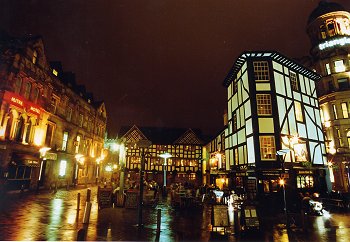| In addition to Liverpool,
British producers also searched the other major northern cities
for "beat" groups they had previously ignored. Manchester (just
up the river from Liverpool) and Birmingham (in the Midlands) fit
the stereotype established by Liverpool: decaying industrial cities
north of London with masses of underemployed youth. And indeed,
they found musical gold in both cities. |
| Manchester is less than
a hundred miles up the Mersey River (and the Irwell River) from
Liverpool and is one of the largest urban industrial areas in England.
During the Second World War the German Luftwaffe certainly thought
that this industrial and port city [connected by the Manchester
Ship Canal to the Mersey River) was important. The foundation of
its original prosperity lay in cotton and weaving which flourished
when the 18th-century canals linked it directly to the ocean. |
|

Shambles Square |
